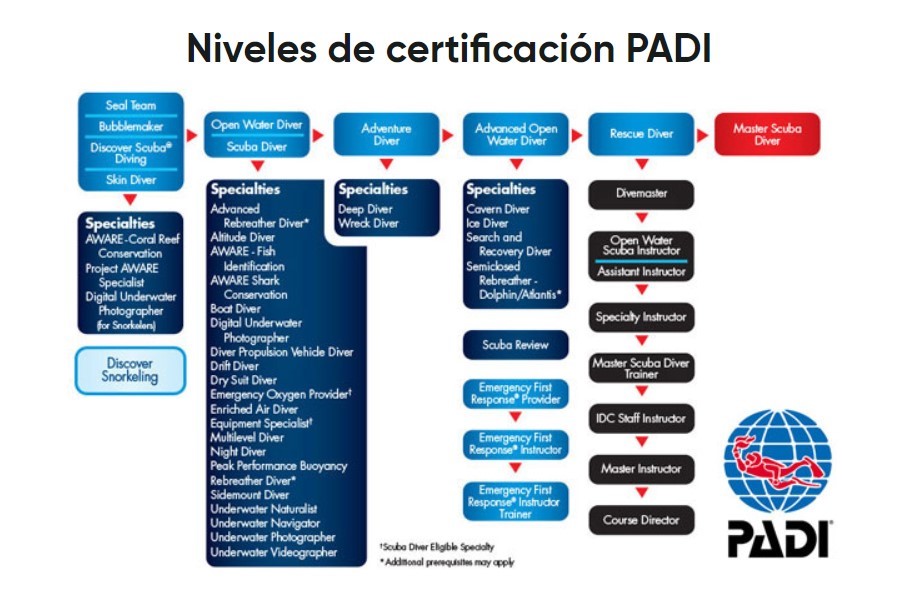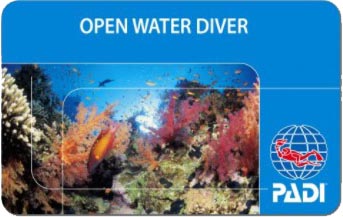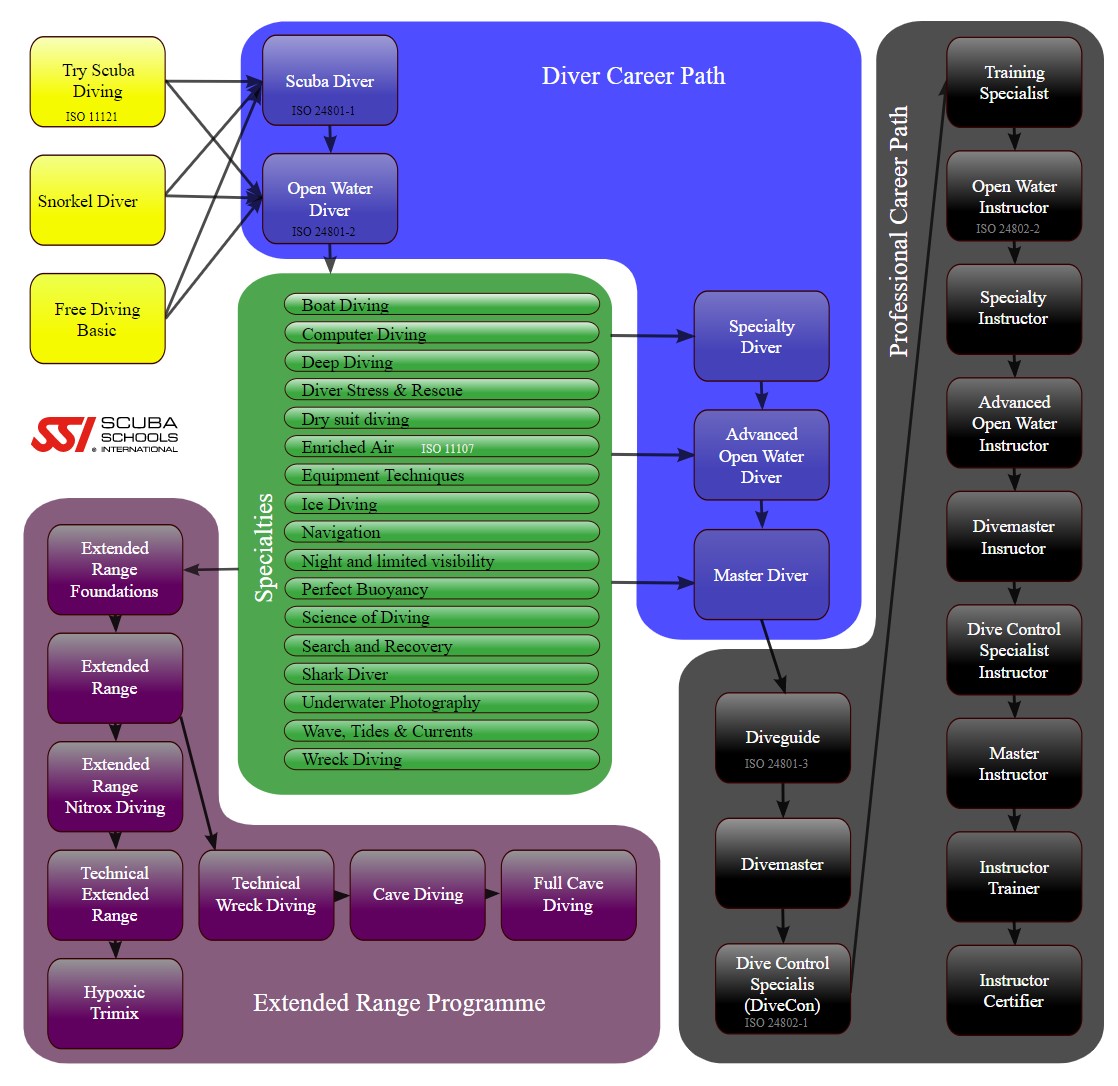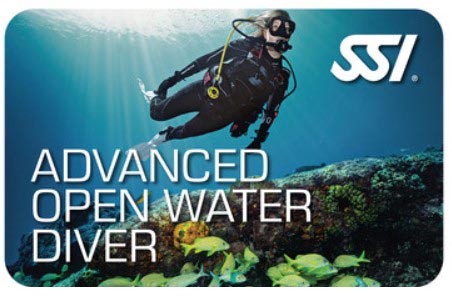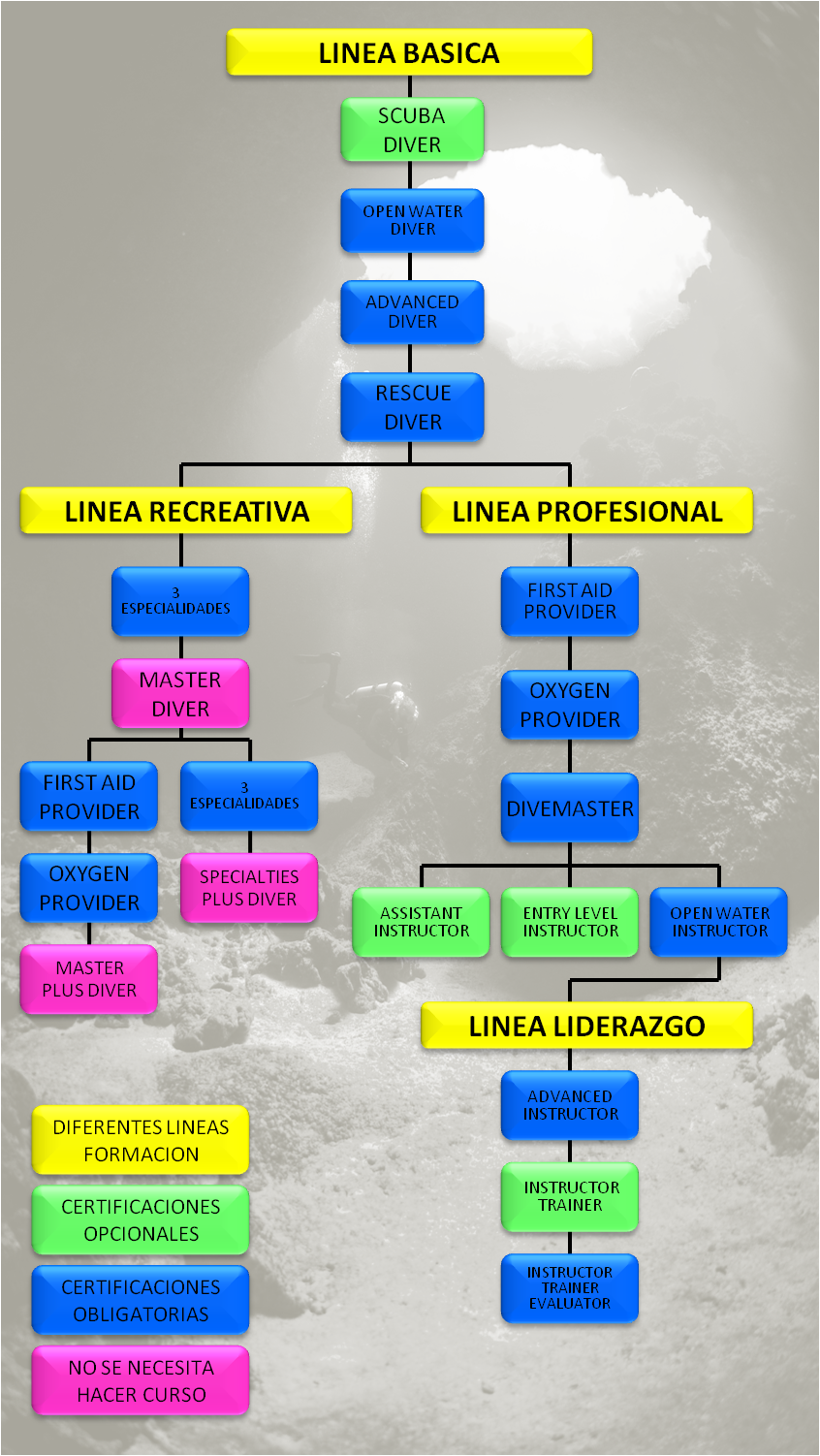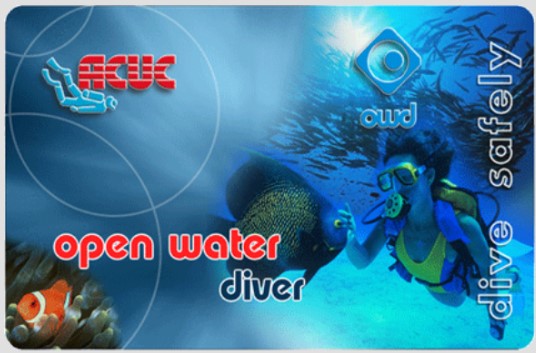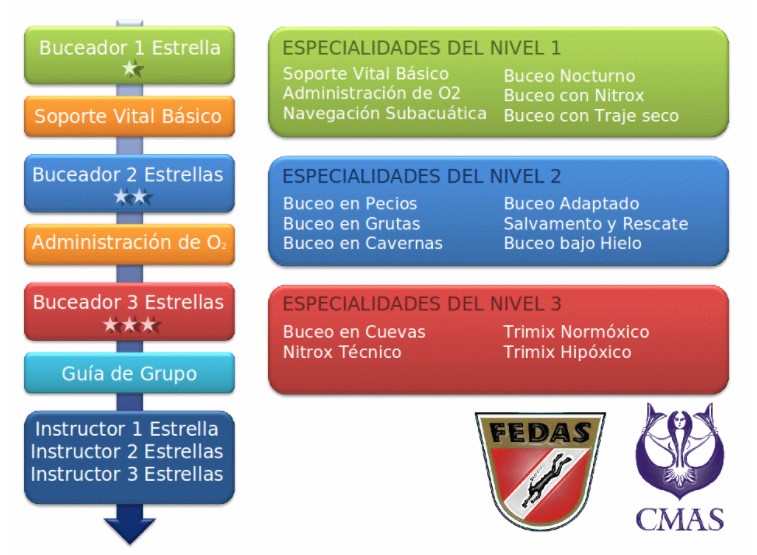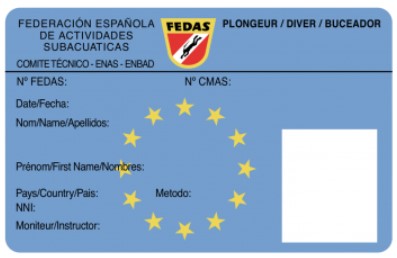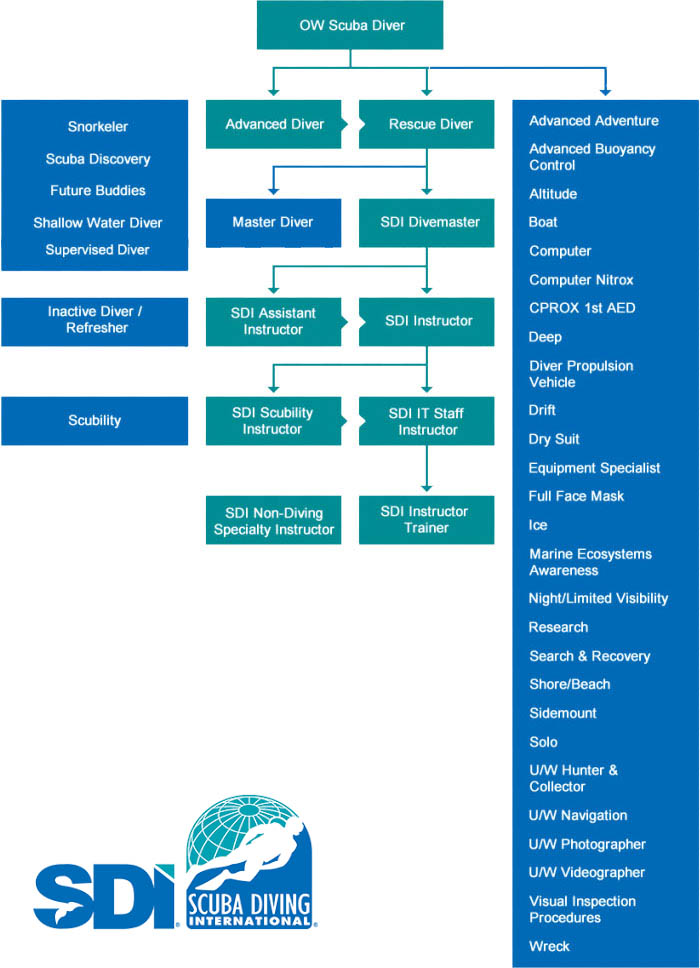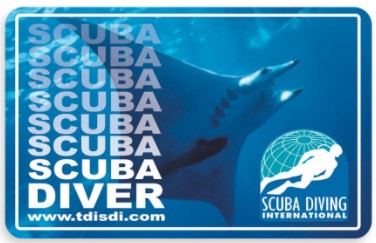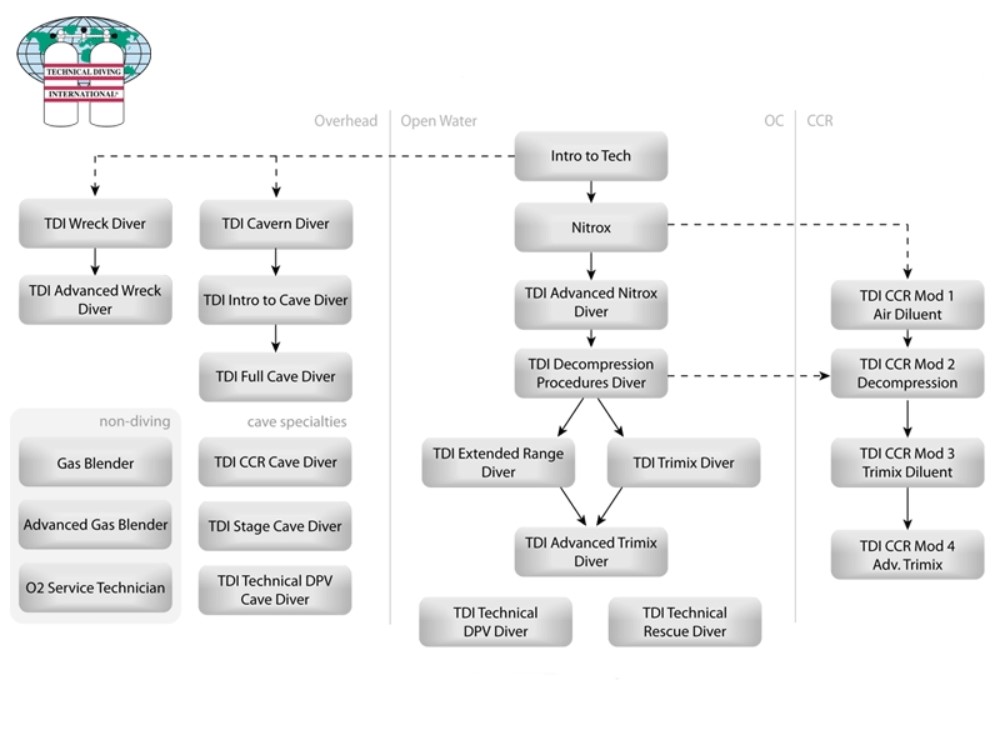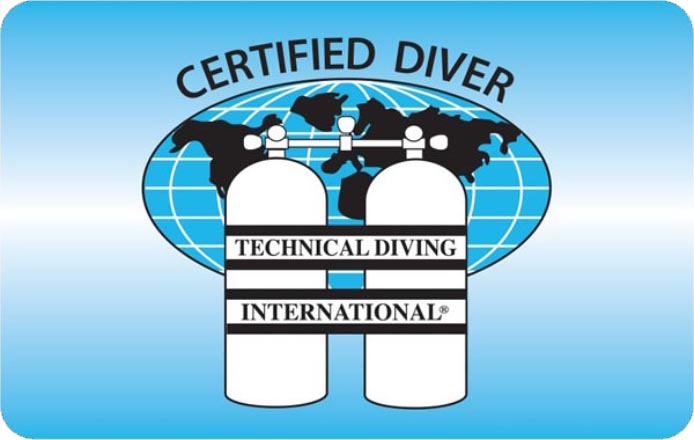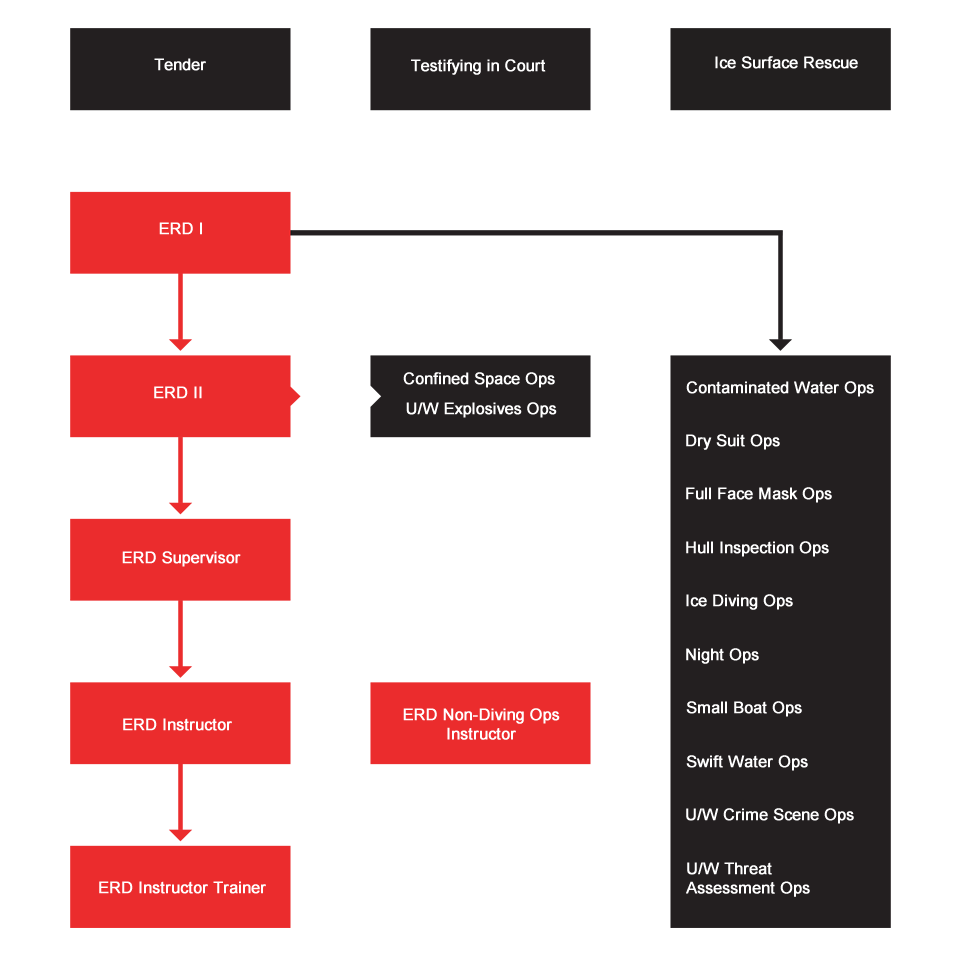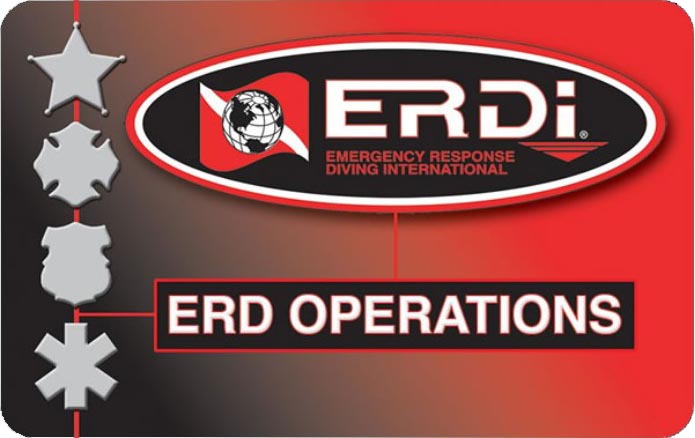certifying agencies
More popular
What is PADI?
PADI (Professional Association of Diving Instructors) is the world's leading diver training organization.
With more than 6,600 PADI Dive Centers and Resorts, and more than 137,000 individual PADI Professionals who have issued more than 27 million certifications worldwide, you'll find PADI scuba courses and services almost anywhere.
The PADI Diver Education System is based on progressive training that introduces skills, safety related information and knowledge of the local environment to student divers in stages. PADI courses are learner-centered and provide maximum practice and realistic applications.
PADI Professionals make underwater exploration and diving adventures possible while maintaining the highest standards of dive training, safety and customer service.
PADI Worldwide is a private, international corporation with service offices and distribution centers in Australia, Brazil, Canada, Japan, Russia, the United Kingdom, and the United States. PADI Worldwide Corporation headquarters are located in California, USA. PADI Regional Offices support the efforts of individual professional members and PADI Dive Centers and Resorts in more than 183 countries and territories. To serve the needs of divers around the world, translations of PADI materials are available in at least 26 languages.
PADI Members influence decisions by sharing their opinions through bulletin boards, personal contacts, group meetings, member seminars and by responding to surveys sent out by PADI Worldwide or PADI Offices. However, the business activities of PADI Members are independent and not owned, managed or controlled by PADI Worldwide or PADI Offices. PADI Dive Centers, Resorts and individual professional members agree to follow the standards set forth in PADI scuba training programs, but are responsible for the day-to-day conduct of PADI programs and supervision of divers and their personnel.
PADI diving courses
PADI has a wide variety of diving courses, which are divided into several educational lines:
Initiation to Diving includes programs that are designed for people who have never done diving before and want to get started in the underwater world. Among them there are experience and training programs that are focused on people from 8 years of age.
· Continuing Education includes programs that help improve the level and knowledge of diving, try and discover new experiences underwater! To be able to participate in one of these programs it is necessary to have the Open Water Diver or even Advanced Open Water qualification.
· Professional Line includes programs, which are designed for people who want to dedicate themselves to Diving and make a Professional career!
And different types of Activity:
Autonomous Diving includes all programs that are performed using stand-alone equipment.
Freediving includes free diving programs, that is, freediving or apnea.
Technical Diving includes more advanced diving programs including Decompression diving and use of gas mixtures.
· Emergency First Response includes First Aid programs.
What is SSI?
SSI (Scuba Schools International)
SSI has been supplying diving training and certifications for over 45 years. Divers, dive instructors, dive centers and resorts all over the world have been trained thanks to this training. Since 1970, SSI has spread to 30 International Offices, with business in 110 countries, represented by more than 2,800 Dive Centers and Resorts and has training materials in more than 30 languages. SSI is the trusted name in the diving world and we attribute that success to our commitment to standards and our focused methodology.
Since June 1, 2010, Scuba Schools International is one of the few training agencies that is qualified with the ISO World Certification. 7 SSI programs, 5 for divers and 2 for instructors, have certifications that comply with International Standards - ISO 11121 for Try Scuba Diving, ISO 24801-1 to 3 for Scuba Diver a Dive Guide, ISO 11107 for Enriched Air Nitrox and 24802- 1 and -2 for Dive Control Specialist and Open Water Diver Instructor. Therefore, in the future, the Certification Cards for the appropriate qualifications will carry the ISO quality label."SSI International: The international headquarters is where the important standardization of SSI diving certification and education takes place. This is where the SSI Training Standards are written and where the skills and techniques for SSI programs are created. Educational materials are also produced here and, with the help of our Service Centers, we translate them into many languages.
SSI Service Centers: SSI Service Centers supervise and provide service to SSI Dive Centers, Dive Resorts and Diving Professionals in the assigned area." SSI Diving Centers and Resorts: It is an extensive network of professional businesses that operate as diving or freediving schools for the training of the diver or diving professional, and provides a variety of diving destinations for its clients. Visit one today to start or continue your underwater adventure!"SSI diving courses
SSI offers a wide variety of diving experiences and courses which can be divided into the following categories:
Start diving includes programs that are designed for people who have never done diving before and want to get started in the underwater world. Among them there are experience and training programs that are focused on people from 8 years of age.
· Advanced Training includes programs that help improve the level and knowledge of diving, try and discover new experiences underwater! To be able to participate in one of these programs it is necessary to have the Open Water Diver or even Advanced Open Water qualification.
· Diving Professional includes programs, which are designed for people who want to dedicate themselves to Diving and make a Professional career!
And different types of Activity:
Autonomous Diving includes all programs that are performed using stand-alone equipment.
Freediving includes free diving programs, that is, freediving or apnea.
Technical Diving includes more advanced diving programs including Decompression diving and use of gas mixtures.
React Right includes First Aid programs.
What is ACUC?
ACUC (American Canadian Underwater Certification)
ACUC began operating in Canada in the 50s. Formerly its initials meant "Association of Canadian Underwater Councils", which can be translated into Spanish as "Association of Canadian Diving Clubs". This means that ACUC has, in 2015, more than 60 years of experience in the world of recreational diving. For a long time, ACUC was the only one, among the main international organizations dedicated to recreational diving, that was born outside the US.
ACUC continued to function in Canada as a Professional Organization, but it was very clear that one of the steps that should be taken to be able to compete, both nationally and internationally, was to go outside Canadian borders.
To take this step, since it was very difficult to function in other countries with a name that meant Association of Canadian Diving Clubs, a more international meaning was sought for the acronym ACUC, without changing the acronym itself, which was already known and respected. for its high standards of quality and safety. The name chosen was American Canadian Underwater Certification or in Spanish: Canadian American Diving Certification.
ACUC Spain began to officially operate in 1990 and stands out as the first international organization to set up a headquarters in Spain, making available to Spanish divers a complete range of educational material in Spanish, which barely existed at that time." Today it is still the International Organization that has the most educational material in Spanish, which has more than 30 manuals on different topics related to diving in different formats, videos and slides are part of this important offer." Since ACUC entered Spain, recreational diving has grown by leaps and bounds in our country. We have forced other organizations, both national and international, to create more material in Spanish and to improve their offer in order to compete with us." Today the Spanish market has a good offer in educational material, courses and diving centers from different national and international organizations. We can say, without fear of lacking humility, that the motor behind these changes was ACUC."
ACUC diving courses
ACUC has the following lines of courses:
· Basic Line includes basic programs such as: Scuba Diver, Open Water, Advanced Diver and Rescue Diver. Recreational Line includes specialty programs · Professional Line includes programs focused on a professional career as a Diving Instructor. Leadership Line It is part of the Professional line and marks the highest level of the career!
What is FEDAS-CMAS?
FEDAS-CMAS (Spanish Federation of Underwater Activities)
FEDAS is the body that regulates sports activities related to the underwater world in our country. Among its sports disciplines we find Sports-recreational Diving, Spearfishing, Freediving, Finswimming, Underwater Orienteering, Underwater Photo and Video, Underwater Hockey, Photosub Hunting, Underwater Rugby and Competition Diving.
SPAIN together with other countries founded in 1959 the CMAS (World Confederation of Underwater Activities), an international organization recognized by the C.O.I. which directs underwater sports activities worldwide."
In Sports Diving (also known as Scuba Diving), Spain was a pioneer by organizing numerous Schools and developing underwater research.
The first Spanish club dedicated exclusively to autonomous immersion was founded in 1954, the C.R.I.S. from Barcelona, and from then to today the number of clubs and diving centers has increased extraordinarily in our country.
FEDAS-CMAS diving courses
CMAS-FEDAS provides courses in the following categories:
Recreational Sports Diving includes programs that are designed for people who want to start the world of diving. Minimum age required 12 years. Scientific Diving includes programs focused on underwater science, among them: Conservation of the Underwater Cultural Heritage, Interpret the Geological Heritage, Discover the Underwater Cultural Heritage, Interpret the Marine Environment and Submerged Cultural and Natural Heritage of our lakes and rivers. · Specialties includes programs for certified divers, who want to learn more about diving in a specific field, among them: Basic Life Support, Oxygen Administration, Nitrox Diving, Introtec, Night Diving, Underwater Navigation, Salvage and Rescue, Dry Suit Diving, Lateral Mount, Adaptive Diving, Ice Diving. Technical Diving includes programs focused on deep diving with decompression and oxygen without exceeding the Pp of 1.4 atm. · Training of Technicians includes a program for those who want to learn how to lead immersion groups, conduct diving trials and collaborate in the teaching and training of divers!
What is SDI?
SDI (Scuba Diving International)
By 1998 TDI members could no longer sustain the great demand for the creation of a TDI sport diving division, and thus Scuba Diving International (SDI) was born. The main reason for this expansion was that the scuba instructors enjoyed dealing with an agency that listened to the field instructors and the programs created were, and continue to be, very profitable as they are tailored to the way the diver Today he wants to learn to dive.
Scuba Diving International (SDI) has its deep roots in advanced diving. It was created by professional educators, who know what it takes to educate qualified divers at all levels. Technical Diving International (TDI) is the largest technical training agency in the world. It was the launching pad for SDI, and Emergency Response Diving International (ERDI), which is the first global public safety diver training agency. You will never outgrow the training opportunities offered by Scuba Diving International and its family of agencies.
SDI training gives you many options for personal development. After your first scuba course, there are literally dozens of continuing education opportunities for you to pursue. These courses prepare you to dive with confidence and have fun in your local waters or oceans around the world. Additionally, SDI offers an easy-to-follow educational system for personal development, and a proven path to dive leadership if you desire a career as a dive professional. Divemaster, Assistant Instructor and Open Water Instructors are among the professional level courses offered and available online.
Scuba Diving International certifications are recognized worldwide. We have over 26 international offices and thousands of SDI facilities, dive centers and instructors around the world. We are members of the World Recreational Scuba Training Council (WRSTC) through its regional RSTCs in Europe, Canada and the United States. SDI programs are approved by the European Underwater Federation (EUF) and the International Organization Standardization (ISO). The certifications you earn with SDI will be accepted by dive centers, charter operators, and dive destinations anywhere your adventure may take you!
SDI diving courses
SSI offers a wide variety of diving experiences and courses which can be divided into the following categories:
Learn to dive includes programs that are designed for people who have never done anything diving before and want to start the world of diving. · Advanced Adventure includes programs that help improve the level and knowledge of diving, try and discover new experiences underwater! To be able to participate in one of these programs it is necessary to have the Open Water Diver or even Advanced Open Water qualification. · Diving Professional includes programs, which are designed for people who want to work or help in teaching diving and become a Professional!
What is TDI?
TDI (Technical Diving International)
It is the largest technical diving agency in the world. Their courses and certifications are recognized everywhere as the gold standard by which others are measured. International Training has more than 26 regional offices around the world and, through its sister sport diving agency, Scuba Diving International, is associated with many leading industry groups such as the World Recreational Scuba Training Council (WRSTC) through its regional RSTCs in Europe, Canada and the United States. The European Underwater Federation (EUF) and the International Organization Standardization (ISO). Your certification, and especially your training, will be recognized and respected throughout the world!
TDI was one of the first agencies of its kind. It focuses on the provision of training and education materials in special areas ranging from Nitrox to Close Circuit Rebreathers, along with confined environments such as Cave and Wreck Diving.
Technical Diving International's (TDI) Technical Diving training program is simple, effective and offers divers a complete pathway from Intro to Tech™ to Advanced Trimix. Formed in 1994, TDI has built a reputation for a comprehensive curriculum that includes cavern to full cave, decompression, trimix and penetrating wreck training. We also offer four levels of closed-circuit rebreather diving certifications to a depth of 100 meters or 330 feet. Complete these offerings with programs for gas mixture preparation and oxygen service equipment, and the program selection is complete. Simply put, TDI is a one-stop technical training solution."
Technical Diving International believes that local conditions demand local knowledge. While our programs are structured to offer a solid understanding of technical diving and develop skills that are universally applicable, we encourage our instructors to go beyond the bare minimum to produce courses that cater to and are tailored to the specific environments of their location. For example, diving in the North Atlantic may require a different approach than drift diving in the warm waters of Indonesia. Our training ensures that you are qualified as well as certified. If you want a career as a diving professional, Technical Diving International (TDI) & Scuba Diving International (SDI) offer: Divemaster (DM), Assistant Instructor (AI), Instructor, Instructor IT Staff and Instructor Trainer (IT) at levels professionals.
TDI diving courses
TDI has the following types of courses:
· Open circuit includes programs that are designed for people who want to get started in the world of diving. Minimum age required 12 years. Rebreather includes programs focused on underwater science, among them: Conservation of the Underwater Cultural Heritage, Interpret the Geological Heritage, Discover the Underwater Cultural Heritage, Interpret the Marine Environment and Submerged Cultural and Natural Heritage of our lakes and rivers. Overhead includes programs for certified divers, who want to learn more about diving in a specific field, including: Basic Life Support, Oxygen Administration, Nitrox Diving, Introtec, Night Diving, Underwater Navigation, Rescue and Rescue, Dry Suit Diving, Side Mount, Adaptive Diving, Ice Diving. Service includes programs focused on deep diving with decompression and oxygen without exceeding the Pp of 1.4 atm. ·Professional includes a program for those who want to learn how to lead immersion groups, conduct diving trials and collaborate in the teaching and training of divers!
What is ERDI?
ERDI (Emergency Response Diving International)
The Emergency Response Diving International™ (ERDI™) Public Safety Diver Training Program offers specialized training to prepare PSD (Public Safety Diver) team members for the rigors of this demanding type of diving. The conditions are often severe, the pressure high, and the risks many and widely varied. The training offered by sport agencies and even technical diving bodies do not address the highly specialized needs of the typical PSD team. ERDI is a proven educational system built by public safety professionals for public safety professionals.
With members now content with their sport and technical diving training options through SDI and TDI, they continued to call for more specialized training in public safety diving, and thus Emergency Response Diving International (ERDI) was born in the year 2000. ERDI was and remains the only training program endorsed by a major certifying agency dedicated solely to public safety diving." Over the years, ERDI has written programs that have trained highly established dive teams such as the Chicago Fire Department, numerous state police dive teams, and various federal agencies."
Emergency Response Diving International™ offers a wide range of programs designed to provide training in ALL key areas of Public Safety Diving.
By choosing ERDI training, a public safety diver will be connected to the most innovative educational system in the diving industry… worldwide! Above all else, the ERDI training will reflect what is happening in the public safety diving community NOW! Emergency Response Diving International is a leader in innovative training.
ERDI diving courses
SSI offers a wide variety of diving experiences and courses which can be divided into the following categories:
· Professional Diver Underwater Collector of Marine Resources · Up to 15 meters deep. · Professional Small Depth Diver ·Up to 30 meters deep. · Professional Diver 2nd class Medium Depth ·Up to 60 meters deep. · Hyperbaric Chamber Operator · Underwater Cutting and Welding
